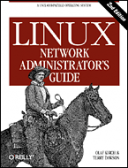Книга: Linux Network Administrator Guide, Second Edition
General Security Considerations
General Security Considerations
A misconfigured PPP daemon can be a devastating security breach. It can be as bad as letting anyone plug their machine into your Ethernet (and that can be very bad). In this section, we discuss a few measures that should make your PPP configuration safe.
NOTE: Root privilege is required to configure the network device and routing table. You will usually solve this by running pppd setuid root. However, pppd allows users to set various security-relevant options.
To protect against any attacks a user may launch by manipulating pppd options, you should set a couple of default values in the global /etc/ppp/options file, like those shown in the sample file in "Using Options Files", earlier in this chapter. Some of them, such as the authentication options, cannot be overridden by the user, and thus provide reasonable protection against manipulations. An important option to protect is the connect option. If you intend to allow non-root users to invoke pppd to connect to the Internet, you should always add the connect and noauth options to the global options file /etc/ppp/options. If you fail to do this, users will be able to execute arbitrary commands with root privileges by specifying the command as their connect command on the pppd line or in their personal options file.
Another good idea is to restrict which users may execute pppd by creating a group in /etc/group and adding only those users who you wish to have the ability to execute the PPP daemon. You should then change group ownership of the pppd daemon to that group and remove the world execute privileges. To do this, assuming you've called your group dialout, you could use something like:
# chown root /usr/sbin/pppd
# chgrp dialout /usr/sbin/pppd
# chmod 4750 /usr/sbin/pppd
Of course, you have to protect yourself from the systems you speak PPP with, too. To fend off hosts posing as someone else, you should always require some sort of authentication from your peer. Additionally, you should not allow foreign hosts to use any IP address they choose, but restrict them to at most a few. The following section will deal with these topics in detail.
- General
- Интегрированная безопасность (NT Integrated Security)
- Appendix I. GNU General Public License
- Speed considerations
- 7.7.2. mod_security
- Managing Password Security for Users
- Managing DNS Security
- UNIX Security Considerations
- DNS Security Considerations
- Using DNS Security Extensions
- Appendix D. SDRAM Interface Considerations
- Passwords and Physical Security




